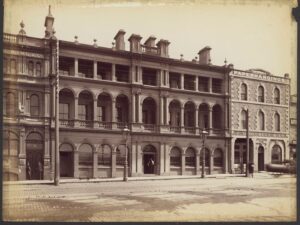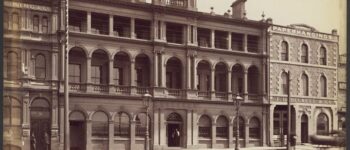1863: “To Make A Cullender of the Colony”
April 2, 2023
By AHNZ

On 28 August, 1863, Lieutenant-Colonel George Dean-Pitt (Jr) established a recruitment office at the Port Phillip Club in Melbourne’s Flinders Street. The Waikato War was underway and Pitt had come from New Zealand looking for fighters. Unfortunately for New Zealand as well as Victorian history the Port Phillip Club was demolished in May 1960. More recently, its replacement, Port Phillip Arcade, has also been demolished by the Victorian State Government who confiscated it for the expansion of their subway network.
Dean Pitt appears to have been responsible for the entire equipping and recruiting program which included getting the men back to Auckland and trained and moved southwards to be distributed to the various posts. These were such places as Howick, Papakura, Drury, Mauku, Waiuku, Pukekohe, and Tuakau. In order to find the men he needed, Pitt did more than sit in the impressive hotel beside the Flinders Street Railway Station and the Yarra River. He traveled to Geelong and the Bendigo and Ballarat goldfields.¹
Pitt had a couple of family advantages. His younger brother William commanded the Victoria Volunteer Force so will have proved a very useful contact for sourcing weapons and men and supplies as well as helping smooth any political troubles. Their father had been Major-General George Dean-Pitt who died while serving as one of New Zealand’s Lieutenant-Governors. George Pitt Senior and William are both buried in Symonds Street Cemetery very near to Grafton Bridge. Ref. 1851: The Old Man of New Ulster, AHNZ
Dean Pitt was evidently very good at his job. According to Leonard Barton in Australians in the Waikato war the results were massive. Over 2,500 soldiers were recruited and 11 ships were charted to take them to the war in New Zealand. On top of this, 1,000 wives and children also got a free ride. Pitt, along with politicians Dillon Bell and John Gorst, also arranged for 2 iron gunboats to be created in Sydney for the New Zealand Government. The remains of one of these, the Pioneer, can still be seen today at Mercer and Ngaruwahia.
“…the Port Phillip Club. This hotel was build on the model of that perfection of comfort, a great English mansion…thick glass windows, shut out the noise of Flinders-street railway station opposite, together with the clatter of the busy traffic in the street.” – Table Talk (1897,) Trove
“…but the New Zealand government have a double object in view, by increasing the strength of their military force, and, at the same time, introducing a very desirable class of immigrants…in proportion as she is benefitted so will Victoria be a loser…allowed to make a cullender of the colony by merely passing through it.” – Bell’s Life in Victoria and Sporting Chronicle (August 1863,) Trove
On the one hand, according to Barton (1979) these Victorians needed new pastures. Alluvial gold was petering out, farming lacked finance, and the cities lacked employment. An Australian, especially one with a family to support, could sign up for George Grey’s Maori War and exchange these problems for all new ones. It was a free ride (perhaps even a train ticket out of the goldfields) to New Zealand for a man and his family who would now be supported. All a man had to do was allow himself to be trained and equipped and serve his tour of duty. And, he could expect property of his own once the Empire had triumphed and confiscated a fair portion of the Waikato lands. For an Aussie down on his luck and looking for a way out this the way to go.
On the other hand the Victorians and the New South Welshmen felt a bit raided by the New Zealanders siphoning off their population. According to Barton’s book the respective state governments were initially supportive of New Zealand’s recruiting but flip-flopped when they realised we were not just after their men but their young families as well! It was a NZ Government-sponsored Brain Drain (or Labour Drain at least.) Especially galling when many of these new Australians had been shipped to the antipodes at Australian taxpayer expense! As Bell’s Life put it in their newspaper, we were making a cullender of their colonies!
Certainly the ex-Australians were backing the right side in the war. Superior organisation and funding made the British Empire the superior War Machine to the Kingite Maoris. According to John Gorst who was part of this Australian resourcing mission the Maoris understood they were asking for doom and would lose the greater part of their lands and risk extermination. To that they Gorst says “they never contested the fact but only replied, “Then let me die with honor.”” Ref. Gorst (1908)
There must be stories about these thousands of ex-Australians who migrated to New Zealand for the war and their descendants. Some would have received their land packages from the Government and abandoned them as useless swamp. Others might have turned again to gold as the New Zealand rushes started up. Some probably fled New Zealand in the 1870s when the gold and the wars ran out and the Vogel Government ran the economy into the ground. It would be very interesting to hear an account of one of these families caught up in this recruitment process and how it worked out for them.
—
1 Ref. Volunteering in Victoria, Daily Southern Cross, Papers Past
Image ref. Port Philip Club, State Library of Victoria; Lost Melbourne, Facebook (2019)
Ref. Authorities move in on Port Phillip Arcade, CBD News (2017)
Ref. Australians in the Waikato war, 1863-1864. Leonard L. Barton (1979)
Ref. New Zealand Revisited: Recollections of the Days of My Youth, John Eldon Gorst (1908)
Ref. also 1860: Victorian Navy Deployed to New Zealand, AHNZ
2 thoughts on "1863: “To Make A Cullender of the Colony”"
Leave a Reply
 Like Comment Share
Like Comment Share






Another great post, enjoyable and educational.
Another great reference for this period is ‘For Glory and a Farm’ by Glen Franks.
That was very informative thanks. Found an abridged version online.
I’m wondering how Dillon Bell pulled this off politically. How did Victoria, NSW, Queensland, and Tasmania go along with exporting their best colonists overseas along with all the money and resources? It must be that the patriotic fervor took on a life of its own. Similar to Belgium in 1914 and The Ukraine today.
ref. http://www.diggerhistory.info/pages-conflicts-periods/other/glory-farm.htm